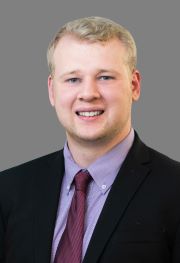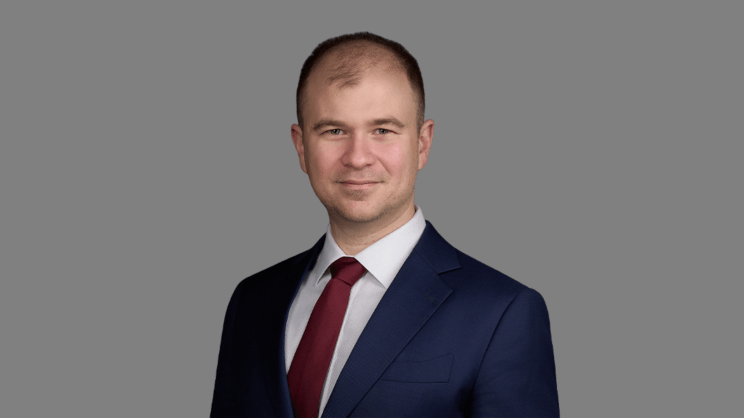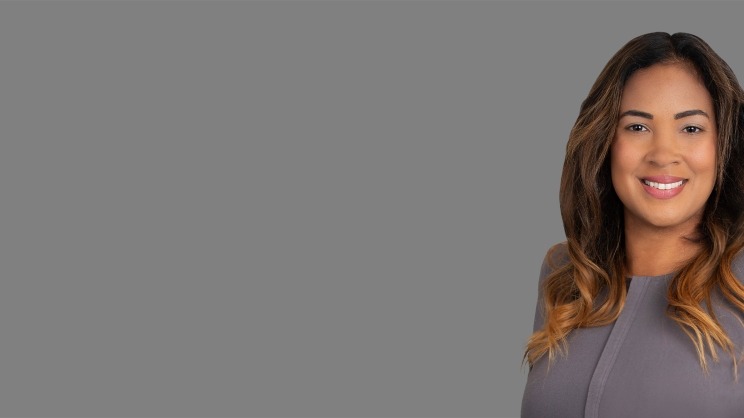Campus Spotlight: Gary Wayne Sawyers Jr.

How to Land a Job After Graduation: An Associate's Insights on Why Networking and Leaving Your Comfort Zone Are Essential Practices for Success
Gary Wayne Sawyers Jr. is an Associate in Alvarez & Marsal’s (A&M) Tax practice in the tri-state area. He earned his bachelor’s degree in accounting and finance from the University of Scranton.
In this Q&A, Gary shares how his college experiences taught him the importance of effort and adaptability, the decision-making process behind his internship at A&M and what motivated him to join the firm full-time. He reflects on the supportive office culture, the unexpected challenges he navigated and his approach to continuous learning and networking. Gary also discusses his mentors' influence, career aspirations and valuable advice for recent graduates transitioning into the professional world.
Reflecting on your college experience, what unexpected lessons or insights have you gained that have significantly impacted your career?
The most pivotal lesson that has profoundly shaped my experience and career and continues to influence my approach to life is that nothing will be handed to you without effort. I remember my first professor at Scranton emphasizing that this approach was deliberately designed to prepare students for the realities of the working world. From that moment, I resolved always to ask questions, seek out others, explore potential opportunities and refuse to remain ignorant of the possibilities around me.
Another invaluable insight I gained during college is the importance of adaptability. Everyone is blind to what will happen next in an ever-changing world. Throughout my college years, I experienced fluctuations in success. However, developing resilience and flexibility in the face of challenges while remaining humble in times of success has greatly benefited my journey. These lessons are directly applicable to the business world. Overall, my career has improved, and I have been exposed to various opportunities to further develop my skills in every aspect.
Why did you choose to intern at A&M?
At the time, I had just completed an audit internship with another company as a rising junior. The profession wasn’t suitable for me, so I explored tax. Initially, I applied for the internship at A&M through Handshake, without any prior connections to the firm. However, I was lucky enough to get a response. Before the interview process, I spoke to a CEO about possible firms with which to intern, and A&M was mentioned. Hence, I decided to learn more. I quickly realized that A&M was a great firm to work at for many reasons and journeyed through the interview process. Ultimately, I received an offer and completed an internship during the summer of my junior year.
What motivated your decision to join A&M full-time?
There are a multitude of reasons, with the most notable being that the work was interesting. Working in taxation is comparable to solving a puzzle. Bringing everything together to yield an answer, all the while doing this for prominent clients, is something that piqued my interest. Additionally, my colleagues during the internship were exceptional to work with and were nothing but helpful and inspiring. Moreover, the firm has outstanding administrative advantages, such as great benefits, fantastic working hours and competitive compensation, to name a few.
Which office are you based in, and how would you describe the office culture?
I am based in Morristown, New Jersey and New York City, New York. The office culture here stands out for its camaraderie and family-like atmosphere among colleagues, from interns to Managing Directors. This environment makes me feel valued, and not just like a number. Everyone in the office is understanding and easy to work with, especially during busy seasons, making the challenge of working and learning simultaneously enjoyable. Lastly, the values and beliefs of A&M are genuinely reflected in the thoughts, words and actions of everyone here. It's rare to find such intelligent and humble people, and I feel blessed to be part of this team.
Navigating Early Career Challenges by Networking and Leveraging Mentors
Reflecting on your career's early stages, what unexpected challenges did you encounter, and how did you navigate them to emerge stronger?
Throughout college, I faced numerous challenges, both personal and academic. I encountered difficulties with coursework and strained relationships with peers who didn't share my growth-oriented, high-achiever mindset. The most significant challenge was the impact of COVID-19. During my first semester, I couldn't reside on campus, missing out on essential networking opportunities with peers and professors and falling behind academically because I couldn't take specific classes.
Despite these setbacks, I persevered. I graduated a semester early—potentially a year earlier, if not for the initial disruption. I successfully created the necessary connections to thrive at the University. Additionally, I completed my studies while serving as President of the most prominent club in the Business School, managing the workload of two honors programs and achieving various other accomplishments. These experiences made me stronger and more resilient.
How do you stay updated on industry trends and developments, and what resources do you rely on for continuous learning and growth?
Staying updated on trends and developments is essential to remain informed and prominent in any industry. Outside work, I read and listen to various accounting and finance articles, podcasts and other literature. Some examples include the Economist, Bloomberg and the Wall Street Journal, among others. While commuting to and from the office, I turn on a podcast in the car and learn about important events. My favorite source of information, which I read daily after waking up, is Morning Brew. I became aware of this resource in college and have utilized it since.
Who are the individuals you consider your closest mentors, and what valuable lessons have you learned from them?
Some of my closest mentors include my parents, colleagues I work with, and my friends. I consider a mentor to be someone who aids in providing advice that pertains not only to the professional world but to personal aspects of life as well. First, my parents have been mentors throughout my life, personally and professionally. I am blessed to have learned invaluable lessons from them, such as a strong work ethic, never taking no for an answer when possible, and how to navigate the world. They are great role models, and I attribute my success to them from a young age. Next are the colleagues I work with, especially at A&M. For example, my boss, Rick, has taught me how to succeed in tax and manage my professional career. If I ever have any questions or concerns, he is always inclined to answer them with his extensive knowledge. Lastly, my friends are exceptionally important; I wouldn’t be anywhere without them. I don’t take the word “friend” lightly, and there are only a select few that I call a friend. From an early age, I have acquired solid and meaningful relationships that I can utilize to better myself and act as a resource for them as well. From life lessons to professional advice, I will always be in debt to them.
Best Practices for Transitioning from Academia to the Professional World
Looking back, what advice would you offer recent graduates about effectively transitioning from academia to the professional world?
Transitioning from school to the professional world can be challenging. The office is much different from the classroom and can be especially challenging for some. There are many more responsibilities to take on, along with being open to numerous other demands from the world. Creating a smooth transition takes work, but it isn’t impossible. Some steps that recent graduates can take to aid in a strong transition are effectively and extensively networking, applying to as many firms as possible, and learning everything possible in their respective industries. Networking is essential and can mean the difference between being employed and unemployed. Connections open the door to various opportunities and should be fostered as much as possible, especially with the state of the job market. Even if the connection doesn’t seem beneficial, it very well could be in the future. Next, applying to as many firms as possible increases the chance for interviews and, in turn, a position. Unfortunately, applying for jobs is a numbers game, as the national percentage of responses from applications is very low-approximately seven percent. However, the more you apply, the greater the chance for a response which ultimately leads to career advancement. Lastly, learning anything and everything you can about your respective industry is crucial to setting themselves apart from other potential candidates. If you aren’t improving yourself, someone else is, and they will be more knowledgeable and more attractive than you for that position.
What are your career aspirations for the next few years?
Within the next few years, my goals are to pass all four parts of the Certified Public Accountant (CPA) examination, move up within A&M, and set myself up for financial success. I am currently studying for the Financial Accounting and Reporting (FAR) section, taking classes to reach 150 credits for licensure, and working simultaneously. It isn’t easy, but it can be done through hard work and dedication, and I intend to accomplish these goals. Additionally, I want to move up from my current position within the firm, advance my career in accounting, and become more knowledgeable about the field. Knowledge is power, and learning is the key to success. Further, setting yourself up for financial success is setting yourself up for overall success.
Building and Fostering Meaningful Relationships for Professional Development
How do you approach networking and building professional relationships, and what tips would you offer to others just starting?
Networking is crucial to success in the professional world. Going about it, however, can be tricky. The way I approach networking is to have a preset plan before you even initiate an interaction. Having a goal for what you want to accomplish can aid in achieving that goal and learning what can be improved upon after the fact. I strive to reach the desired objective by the end of the interaction, or at the very least, set myself up to accomplish it at some point. Whether learning more about a firm or just establishing a connection that may help at some point in the future, setting a goal will aid in accomplishing the desired outcome(s). Next is to know how you will initiate the interaction. A common way that interactions begin is with conversation, so having a way to start the conversation is critical to setting up the rest of the interaction. Moreover, ensuring that I have my elevator pitch ready at any given moment is essential, since part of the process includes introducing yourself to the receiving party. A good introduction and elevator pitch to sell yourself can ultimately make or break what happens. Lastly, following up with the other party after the interaction has ended demonstrates that you are serious about becoming a meaningful connection and can set yourself apart from others. For example, always send a thank you email or letter after an interview. Overall, the biggest piece of advice I can offer to people just starting is to network as much as possible, as this not only increases the chance of landing a job but to become more proficient in the art of networking.
What's the best advice you've ever received, and how has it influenced your life?
The best piece of advice that I have ever received throughout my life and career is this: “The fastest way to transform your life for the better is to be unsatisfied with where you are now.” This needs to be taken within reason, as sometimes there is a point where further progress can’t be achieved. However, that situation doesn’t apply to most. Going out of your comfort zone is the only way to progress effectively. Progress is how you “level up” in your life, whether that be in the professional or personal sense. If you remain in your comfort zone, you will never achieve practical goals, build self-confidence or resilience, or learn important lessons about yourself as a human being. I try to leave my comfort zone to accomplish a goal whenever I can. Ultimately, this has expedited my personal development and has allowed me to grow, even if that means sometimes making tough decisions. A blueprint to leaving your comfort zone is to follow these steps: setting a goal and making a plan, taking action while finding boundaries, confronting fears, adjusting on the fly, assessing the results and creating new goals for the next time.
If you could have dinner with three people, living or dead, who would they be and why?
I have always admired specific people throughout history, but if I had to choose only three, they would be, in no particular order: Henry Ford, Adam Smith and Derek Jeter. Henry Ford is a rags-to-riches story, which rarely happens in modern society. He created something that practically everyone uses, and numerous lessons can be learned from his actions, such as having a solid work ethic, reaching out for advice and help from others, and investing in what works, to name a few. Second would be Adam Smith, the father of modern economics, who has helped many escape poverty and other financial distress from communist, socialist and harmful systems worldwide. To be that intelligent is astounding, and to create the theory that the free world revolves around is one of the most significant accomplishments of all time. The last person I would have dinner with is Derek Jeter. I have met Jeter once before, but it was very brief. I grew up all my life playing baseball, and as a Yankees fan, he was undisputably my idol. I always dreamed of playing in the pros, but even though that didn’t happen, I still look up to him. This is not only because he was one of the greatest players of all time but also because he is a humble, courteous and great human being.




